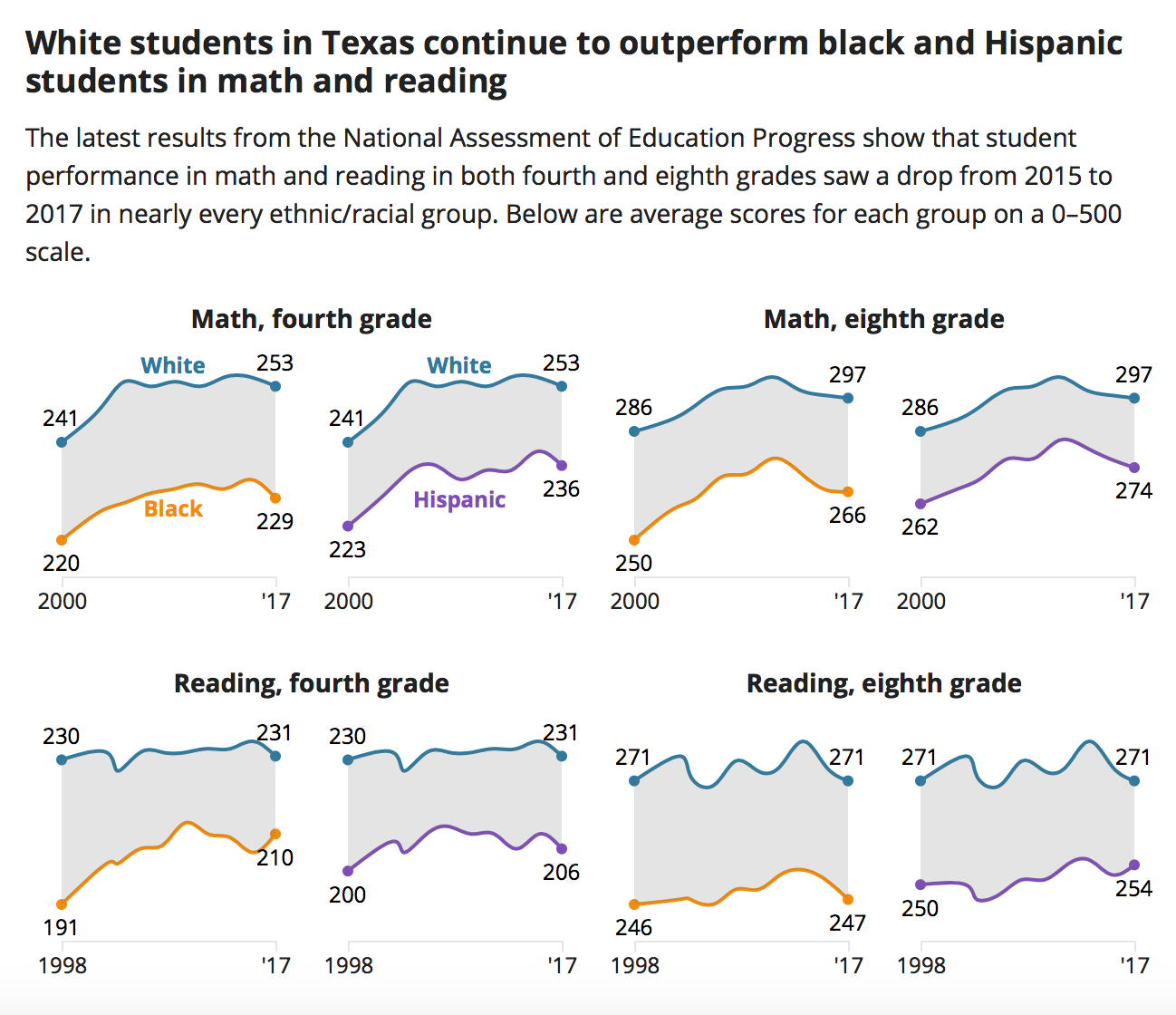This article was originally published by the The Texas Tribune.
Texas, like the nation, has stagnated in elementary and middle school academic achievement and continues to fail to get black and Hispanic students performing as well as white students, according to a national "report card" out this week.
The National Assessment of Education Progress, given every two years to a sample of fourth- and eighth-grade students in reading and math, is designed to measure student academic performance nationally over time — giving states a sense of how they're doing compared to a national average. It also compares data from 27 school districts in urban areas, including Austin, Houston, Dallas and Fort Worth ISDs.
The poor showing has Texas education leaders promising to make some changes.
In a statement, Texas Education Commissioner Mike Morath promised to improve "foundational reading and math skills" by focusing on districts that need additional support and giving math and reading teachers more opportunities for professional development.
But experts warn against making broad conclusions for or against any specific education strategy: a small percentage of students from a small percentage of schools take the test every two years.

Texas Tribune
Texas has generally done better in math than the national average. The 2017 test results show Texas struggling to keep pace in fourth and eighth grade reading compared to past years, even when accounting for a student population that is less affluent and more in need of specialized education programs, such as bilingual education, than those of many other states.
White students in Texas continue to outperform black and Hispanic students in all subjects. But black and Hispanic students in Texas often perform better than those in many other states.
Compared to the national average, Texas has a smaller percentage of kids in reading considered "proficient," which is a high standard. It has a higher percentage of students at or below a "basic" achievement level in reading.
"Results for 2017 show that our African American, Hispanic, and white students perform in the top 10 of all states in mathematics, but reading results are lagging, as are overall averages," Morath said.
The national reading results aren't entirely out of the blue. Texas' state standardized test results last year also showed a decline in reading, with most students doing worse compared to previous years. In response last July, Morath and Gov. Greg Abbott launched a new reading initiative, billed as a plan to give teachers more tools to improve student literacy.
Some conservatives in favor of tougher education standards and more standardized testing are using the data to argue Texas needs to hold school districts to higher accountability standards.
"The nation has gone nowhere since 2009," said Sandy Kress, former senior adviser to President George W. Bush and an architect of the now-scrapped federal No Child Left Behind Act, which held states to strict achievement and testing standards. "We really haven't been taking accountability seriously in any level of K-12."
U.S. Secretary of Education Betsy DeVos pointed out in a statement Tuesday that Florida was the only state that showed significant academic gains. Texas is set to debut a system to hold schools and districts accountable that will for the first time grade them on a scale from A through F. Florida has graded its school districts since 1999.
"Florida has been making changes to the accountability system in the last decade or so. It's paying off," said Emily Sass, policy expert at right-leaning Texas Public Policy Foundation. "If we're moving toward what Florida is doing, it would indicate we're moving in the right direction."
But critics of high-stakes testing came to the opposite conclusion. Theresa Treviño, president of Texans Advocating for Meaningful Assessment, said the switch to a new standardized test in the last several years, and changes to state curriculum standards, could be contributing to Texas' struggles. "That could have had a more profound effect on Texas than even A through F could have had on Florida," she said.
Disclosure: The Texas Public Policy Foundation and Moak, Casey & Associates have been financial supporters of The Texas Tribune, a nonprofit, nonpartisan news organization that is funded in part by donations from members, foundations and corporate sponsors. Financial supporters play no role in the Tribune's journalism. Find a complete list of them here.

